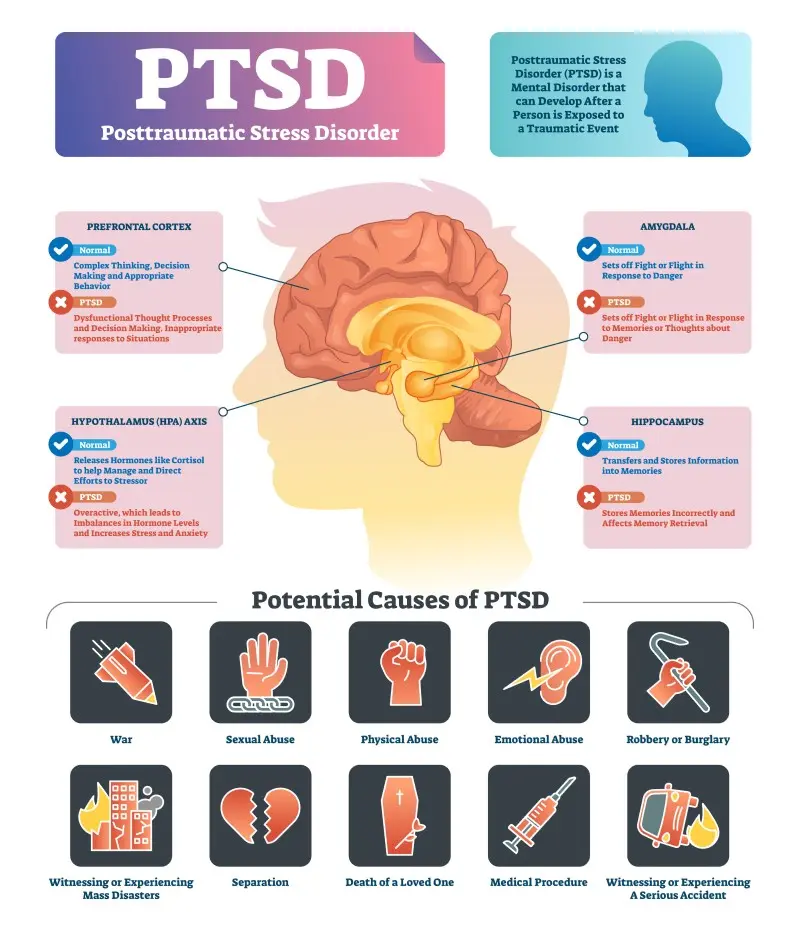The only MedSpa in Colorado backed by Medical Doctor, Anesthesiologist & 2022 Physician of the Year, Dr. Jan Gillespie.
The only MedSpa in Colorado backed by Medical Doctor, Anesthesiologist & 2022 Physician of the Year, Dr. Jan Gillespie.
Although post-traumatic stress disorder (PTSD) is commonly linked to war veterans, it can affect anyone who has experienced trauma. With personalized treatment, you can manage your PTSD symptoms and lead a healthy, active life. At NoCo MedSpa & IV Therapy in Greeley, CO, our Anesthesiologist and Anesthetist provide ketamine IV infusion therapy for PTSD. This innovative and fast-acting treatment is effective for PTSD and other mental health conditions. Call us today or schedule a consultation online to see if ketamine IV infusion therapy is right for you.
Post-traumatic stress disorder (PTSD) is a complex psychiatric condition that can develop following any type of traumatic experience. It manifests through a variety of disruptive symptoms, which may include:
PTSD is a highly personal condition; each individual experiences and responds to trauma differently. The severity and combination of symptoms can vary widely from person to person.
The exact causes of PTSD are not fully understood. However, experiencing a traumatic event can trigger changes in the brain’s chemistry and hormone regulation in response to stress.
Several factors can increase your risk of developing PTSD:
One promising treatment for PTSD is ketamine IV infusion therapy. This therapy provides rapid relief from symptoms of depression and anxiety, offering the mental and emotional clarity needed for effective talk therapies. Ketamine IV infusion therapy complements other PTSD treatments such as processing therapies, desensitization therapies, and various psychotherapies.
Initial Consultation: Your journey begins with a thorough consultation with an Anesthesiologist or Anesthetist to determine if ketamine IV infusion therapy is suitable for you.
Treatment Plan: Typically, the initial treatment involves a series of six infusion sessions. Each session lasts about an hour, with a 40-minute infusion followed by a 20-minute recovery period.
Infusion Sessions: You will receive a low-dose ketamine infusion (approximately 0.5 mg/kg/hr). During the treatment, you may experience a relaxed or floating sensation along with other mild side effects that usually subside quickly after the session.
Monitoring and Follow-up: Depending on your response to the initial sessions and the severity of your symptoms, regular follow-up infusions may be recommended. Your Anesthesiologist and Anesthetist will carefully monitor you during each session to ensure your safety and adherence to best practice standards.
If you are interested in learning more about how ketamine IV infusion therapy can support your PTSD treatment, call us or schedule an appointment online today. At NoCo MedSpa & IV Therapy in Greeley, Colorado, we specialize in providing ketamine treatments for depression and other PTSD symptoms. Our experienced team is dedicated to helping you achieve mental and emotional well-being.
Prevalence: Approximately 8% of Americans will experience PTSD at some point in their lives. Women are twice as likely as men to develop PTSD.
Not Just for Veterans: While PTSD is often associated with military veterans, it can affect anyone who has experienced a traumatic event, including natural disasters, accidents, or personal assaults.
Children Can Get PTSD Too: PTSD can occur at any age. Children who experience or witness traumatic events can develop PTSD, affecting their development and daily life.
Delayed Onset: Symptoms of PTSD might not appear immediately after the traumatic event. Sometimes, they can manifest months or even years later.
Comorbidity: PTSD often coexists with other mental health conditions such as depression, anxiety, and substance abuse disorders, complicating diagnosis and treatment.
Physical Symptoms: PTSD can cause physical symptoms, including headaches, dizziness, chest pain, and gastrointestinal problems, as the body reacts to chronic stress.
Impact on Relationships: PTSD can strain personal relationships, leading to difficulties in maintaining connections with family, friends, and coworkers.
Innovative Treatments: Beyond traditional therapies, innovative treatments like ketamine IV infusion therapy and virtual reality exposure therapy are showing promise in alleviating PTSD symptoms.
Neurobiological Changes: PTSD can alter brain structure and function, particularly in areas related to memory and emotion regulation, such as the amygdala and hippocampus.
Stigma and Misunderstanding: Despite increased awareness, many people with PTSD still face stigma and misunderstanding, which can hinder their willingness to seek help.
Effective Treatments: Various effective treatments are available, including cognitive-behavioral therapy (CBT), eye movement desensitization and reprocessing (EMDR), and medications, offering hope for recovery.
Resilience and Recovery: With proper support and treatment, many people with PTSD can recover and lead fulfilling lives, demonstrating remarkable resilience and strength.
